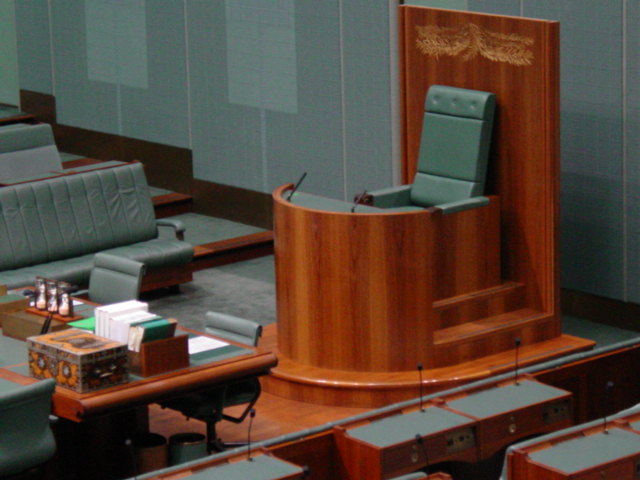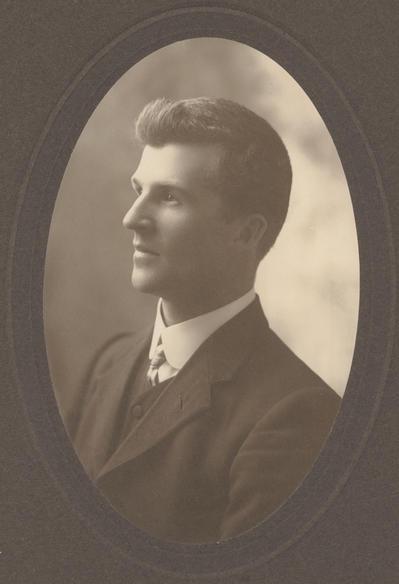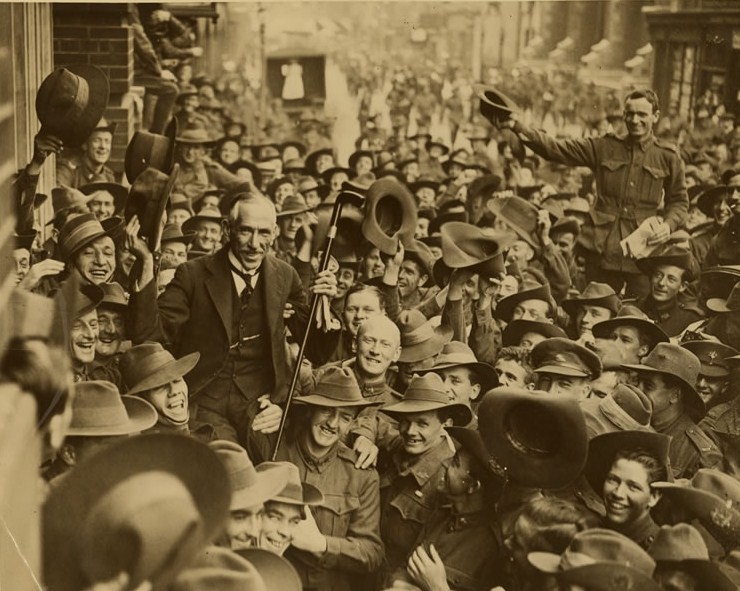|
Charles McGrath
David Charles McGrath (10 November 1872 – 31 July 1934) was an Australian politician. Originally a member of the Australian Labor Party, he joined Joseph Lyons in the 1931 Labor split that led to the formation of the United Australia Party. Early life McGrath was born at Newtown, Victoria to David McGrath, an Irish-born miner, and Evelyn, née Horsefield, an Englishwoman. He attended Newtown State and Creswick Grammar schools before working at the family store at Allendale. He was a member of the South Ballarat football team during the 1890s. He married Elizabeth Johnstone Gullan in Ballarat on 24 May 1898; the couple moved to Pitfield Plains in 1900 to expand the family business. State politics In 1904, McGrath was elected to the Victorian Legislative Assembly for Labor, representing the seat of Grenville. He became known as a spokesman for the mining industry, and earned the nickname "Bull" for his promotion of Labor in country areas; with Frank Anstey, he travelled e ... [...More Info...] [...Related Items...] OR: [Wikipedia] [Google] [Baidu] |
Division Of Ballarat
The Division of Ballarat (spelt Ballaarat from 1901 until the 1977 election) is an Australian electoral division in the state of Victoria. The division was proclaimed in 1900, and was one of the original 65 divisions to be contested at the first federal election. It was named for the provincial city of the same name by Scottish squatter Archibald Yuille, who established the first settlement − his sheep run called Ballaarat − in 1837, with the name derived from a local Wathawurrung word for the area, ''balla arat'', thought to mean "resting place". The division currently takes in the regional City of Ballarat and the smaller towns of Bacchus Marsh, Ballan, Blackwood, Buninyong, Clunes, Creswick, Daylesford, Myrniong and Trentham and part of Burrumbeet. The current Member for Ballarat, since the 2001 federal election, is Catherine King, a member of the Australian Labor Party. Geography Since 1984, federal electoral division boundaries in Australia have been determ ... [...More Info...] [...Related Items...] OR: [Wikipedia] [Google] [Baidu] |
Gippsland, Victoria
Gippsland is a rural region that makes up the southeastern part of Victoria, Australia, mostly comprising the coastal plains to the rainward (southern) side of the Victorian Alps (the southernmost section of the Great Dividing Range). It covers an elongated area of located further east of the Shire of Cardinia (Melbourne's outermost southeastern suburbs) between Dandenong Ranges and Mornington Peninsula, and is bounded to the north by the mountain ranges and plateaus/highlands of the High Country (which separate it from Hume region in Victoria's northeast), to the southwest by the Western Port Bay, to the south and east by the Bass Strait and the Tasman Sea, and to the east and northeast by the Black-Allan Line (the easternmost section of the Victoria/New South Wales state border). The Gippsland region is generally divided by the Strzelecki Ranges and tributaries of the Gippsland Lakes into five statistical sub-regions — namely the West Gippsland, South Gippsland, Latrobe ... [...More Info...] [...Related Items...] OR: [Wikipedia] [Google] [Baidu] |
World War I
World War I (28 July 1914 11 November 1918), often abbreviated as WWI, was one of the deadliest global conflicts in history. Belligerents included much of Europe, the Russian Empire, the United States, and the Ottoman Empire, with fighting occurring throughout Europe, the Middle East, Africa, the Pacific, and parts of Asia. An estimated 9 million soldiers were killed in combat, plus another 23 million wounded, while 5 million civilians died as a result of military action, hunger, and disease. Millions more died in genocides within the Ottoman Empire and in the 1918 influenza pandemic, which was exacerbated by the movement of combatants during the war. Prior to 1914, the European great powers were divided between the Triple Entente (comprising France, Russia, and Britain) and the Triple Alliance (containing Germany, Austria-Hungary, and Italy). Tensions in the Balkans came to a head on 28 June 1914, following the assassination of Archduke Franz Ferdin ... [...More Info...] [...Related Items...] OR: [Wikipedia] [Google] [Baidu] |
Otto Niemeyer
Sir Otto Ernst Niemeyer (23 November 1883 – 6 February 1971) was a British banker and civil servant. He served as a director of the Bank of England from 1938 to 1952 and a director of the Bank for International Settlements from 1931 to 1965. An Oxford graduate, Niemeyer began working for HM Treasury in 1906 and rose rapidly through the ranks, finishing his time there as controller of finance (1922–1927). He was recruited to the Bank of England by Montagu Norman, 1st Baron Norman, Montagu Norman, and represented the bank at the League of Nations and on a number of missions overseas. His visit to Australia in 1930 contributed to a political crisis that resulted in the Australian Labor Party split of 1931 and the collapse of James Scullin's government. Personal life Niemeyer was born in Streatham, London, the eldest of three children born to Ethel (née Rayner) and Ernst August Wilhelm Niemeyer. His mother was English. His father, originally from Hanover, Germany, arrived in B ... [...More Info...] [...Related Items...] OR: [Wikipedia] [Google] [Baidu] |
Great Depression
The Great Depression (19291939) was an economic shock that impacted most countries across the world. It was a period of economic depression that became evident after a major fall in stock prices in the United States. The economic contagion began around September and led to the Wall Street stock market crash of October 24 (Black Thursday). It was the longest, deepest, and most widespread depression of the 20th century. Between 1929 and 1932, worldwide gross domestic product (GDP) fell by an estimated 15%. By comparison, worldwide GDP fell by less than 1% from 2008 to 2009 during the Great Recession. Some economies started to recover by the mid-1930s. However, in many countries, the negative effects of the Great Depression lasted until the beginning of World War II. Devastating effects were seen in both rich and poor countries with falling personal income, prices, tax revenues, and profits. International trade fell by more than 50%, unemployment in the U.S. rose to 23% and ... [...More Info...] [...Related Items...] OR: [Wikipedia] [Google] [Baidu] |
Chairman Of Committees (Australian House Of Representatives)
The Speaker of the House of Representatives is the presiding officer of the House of Representatives, the lower house of the Parliament of Australia. The counterpart in the upper house is the President of the Senate. The office of Speaker was created by section 35 of the Constitution of Australia. The authors of the Constitution intended that the House of Representatives should as nearly as possible be modelled on the House of Commons of the United Kingdom. The Speaker presides over House of Representatives debates, determining which members may speak. The Speaker is also responsible for maintaining order during debate, and may punish members who break the rules of the House. The Speaker is currently Milton Dick, who was elected on 26 July 2022. Election The Speaker is elected by the House of Representatives in a secret ballot, with an election held whenever the Office of the Speaker is vacant, as set out in Chapter 3 of the House of Representatives Standing and Sessional Or ... [...More Info...] [...Related Items...] OR: [Wikipedia] [Google] [Baidu] |
1929 Australian Federal Election
The 1929 Australian federal election was held in Australia on 12 October 1929. All 75 seats in the House of Representatives were up for election, but there was no Senate election. The election was caused by the defeat of the Stanley Bruce-Earle Page Government in the House of Representatives over the ''Maritime Industries Bill'', Bruce having declared that the vote on the bill would constitute a vote of confidence in his government. With senators having fixed six-year terms, the terms of those senators elected in 1926 were not due to expire until 1932. Under the Constitution of Australia, no election for their replacement could occur more than a year prior to their terms expiring, except in the case of a double dissolution; since the constitutional conditions for a double dissolution did not exist, it was not possible to hold a half-Senate election in 1929. This was the first Commonwealth election for the House of Representatives only. In the election, the incumbent Nationalist-C ... [...More Info...] [...Related Items...] OR: [Wikipedia] [Google] [Baidu] |
James Scullin
James Henry Scullin (18 September 1876 – 28 January 1953) was an Australian Labor Party politician and the ninth Prime Minister of Australia. Scullin led Labor to government at the 1929 Australian federal election. He was the first Catholic, as well as Irish-Australian, to serve as Prime Minister of Australia. The Wall Street Crash of 1929 transpired just two days after his swearing in, which would herald the beginning of the Great Depression in Australia. Scullin's administration would soon be overwhelmed by the economic crisis, with interpersonal and policy disagreements causing a three-way split of his party that would bring down the government in late 1931. Despite his chaotic term of office, Scullin remained a leading figure in the Labor movement throughout his lifetime, and served as an ''éminence grise'' in various capacities for the party until his retirement in 1949. The son of working-class Irish-immigrants, Scullin spent much of his early life as a laborer an ... [...More Info...] [...Related Items...] OR: [Wikipedia] [Google] [Baidu] |
Repatriation
Repatriation is the process of returning a thing or a person to its country of origin or citizenship. The term may refer to non-human entities, such as converting a foreign currency into the currency of one's own country, as well as to the process of returning military personnel to their place of origin following a war. It also applies to diplomatic envoys, international officials as well as expatriates and migrants in time of international crisis. For refugees, asylum seekers and illegal migrants, repatriation can mean either voluntary return or deportation. Repatriation of humans Overview and clarification of terms Voluntary vs. forced return Voluntary return is the return of eligible persons, such as refugees, to their country of origin or citizenship on the basis of freely expressed willingness to such return. Voluntary return, unlike expulsion and deportation, which are actions of sovereign states, is defined as a personal right under specific conditions described in ... [...More Info...] [...Related Items...] OR: [Wikipedia] [Google] [Baidu] |
1920 Ballaarat By-election
A by-election was held for the Australian House of Representatives seat of Division of Ballarat, Ballaarat on 10 July 1920. At the 1919 Australian federal election, 1919 federal election, Nationalist Party of Australia, Nationalist candidate Edwin Kerby had defeated the sitting Australian Labor Party, Labor MP, Charles McGrath, by a single vote, the narrowest margin in Australian electoral history. McGrath challenged the result successfully on the grounds of electoral irregularities, triggering the by-election, at which McGrath was victorious. Results References {{Aus by-elections 8th parl 1920 elections in Australia Victorian federal by-elections 1920s in Victoria (Australia) ... [...More Info...] [...Related Items...] OR: [Wikipedia] [Google] [Baidu] |
Nationalist Party Of Australia
The Nationalist Party, also known as the National Party, was an Australian political party. It was formed on 17 February 1917 from a merger between the Commonwealth Liberal Party and the National Labor Party, the latter formed by Prime Minister Billy Hughes and his supporters after the 1916 Labor Party split over World War I conscription. The Nationalist Party was in government (from 1923 in coalition with the Country Party) until electoral defeat in 1929. From that time it was the main opposition to the Labor Party until it merged with pro-Joseph Lyons Labor defectors to form the United Australia Party (UAP) in 1931. The party is a direct ancestor of the Liberal Party of Australia, the main centre-right party in Australia. History In October 1915 the Australian Prime Minister, Andrew Fisher of the Australian Labor Party, retired; Billy Hughes was chosen unanimously by the Labor caucus to succeed him. Hughes was a strong supporter of Australia's participation in World War ... [...More Info...] [...Related Items...] OR: [Wikipedia] [Google] [Baidu] |
1919 Australian Federal Election
The 1919 Australian federal election was held on 13 December 1919 to elect members to the Parliament of Australia. All 75 seats in the House of Representatives and 19 of the 36 seats in the Senate were up for election. The incumbent Nationalist Party government won re-election, with Prime Minister Billy Hughes continuing in office. The 1919 election was the first held since the passage of the ''Commonwealth Electoral Act 1918'', which introduced preferential voting for both houses of parliament – instant-runoff voting for the House of Representatives and preferential block voting for the Senate. It was held several months earlier than constitutionally required, so that the government could capitalise on the popularity of Hughes after his return from the Paris Peace Conference. The Nationalists campaigned on the government's war record and appealed to return soldiers. The Australian Labor Party (ALP), in opposition since the 1916 party split, contested a second election under ... [...More Info...] [...Related Items...] OR: [Wikipedia] [Google] [Baidu] |









